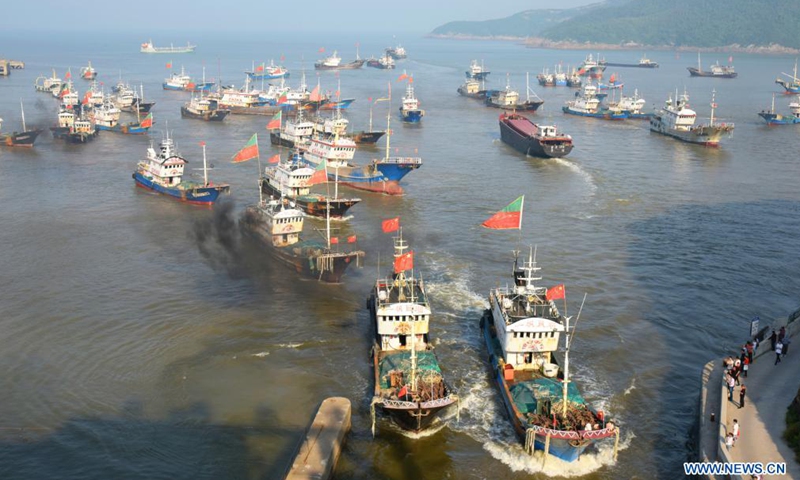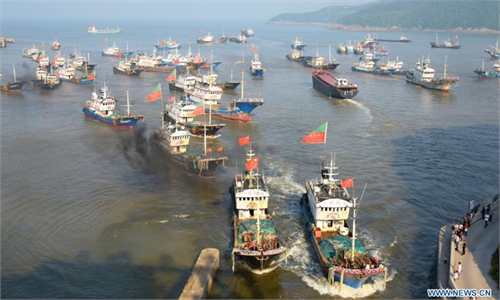
Photo taken on April 30, 2021 shows fishing vessels sail back to a port before the enforcement of annual summer fishing ban, at Jinqing Town of Luqiao District in Taizhou, east China's Zhejiang Province. The annual summer fishing ban, covering the Bohai Sea, the Yellow Sea, the East China Sea, and the waters north to 12 degrees north latitude of the South China Sea, started Saturday.Photo:Xinhua
China's fishery authority will carry out fishing moratoriums on some part of high seas to conserve squid resources, starting on Thursday. Experts said that the three-month moratorium will be conducive to the sustainable development of fishing on the high seas.
The Chinese experts stressed that China strictly complies with international high seas fishing regulations and follows the principle of sustainable development, refuting Western media rumors of "China's illegal fishing."
From July 1 to September 30, the moratorium will be carried out in parts of the high seas of the southwest Atlantic Ocean outside the exclusive economic zones of relevant countries. From September 1 to November 30, the moratorium will be rolled out in parts of the high seas in the Eastern Pacific Ocean, China's Ministry of Agriculture and Rural Affairs announced on Monday.
During the ban, all Chinese squid fishing vessels should stop fishing in these areas so as to conserve squid resources on the high seas, the ministry said.
"The two regions selected to roll out bans are places where China has a better understanding of the resources and more mature management over ocean-going fishing vessels," Wang Yamin, a professor at Shandong University's School of Oceanography, told the Global Times on Tuesday.
"Squid have a relatively shorter growth cycle, so that a better effect can be achieved for a fishing ban targeting squid," Wang added.
Wang noted that the three-month moratoriums will have a short-term impact on the income of fishery enterprises, but will be conducive to the sustainable development of fishing on the high seas.
Last year, China piloted a fishing ban on the high seas targeting squid. More than 600 ocean-going fishing vessels and auxiliary vessels from over 70 fishing companies were all evacuated according to regulations, and no illegal fishing activities were found within the area of the moratorium.
After the trial, the output of squid from January to April in the two regions increased compared with the same period last year, according to the announcement.
"China's fishing on the high seas has undergone development in recent years, following the country's economic improvement and the demand of the domestic market," Wang said. "However, there are actually not that many deep-sea fishing vessels in China, if we judge from the size of China's fishery industry."
Wang refuted rumors hyped by some Western media. Some accused China of "illegal fishing" and "depleting fishing resources."
"To tackle illegal fishing, the Chinese government has gradually tightened its oversight of deep-sea fishing vessels in recent years, such as requiring vessels to install the BeiDou Navigation Satellite System, checking fishing boat logs, and establishing an observer system," Wang said.
In April, China sent its first group of five observers into international waters to board long-distance fishing vessels and supervise their activities on the high seas on behalf of the government, to further strengthen its supervision of long-distance fishing.


